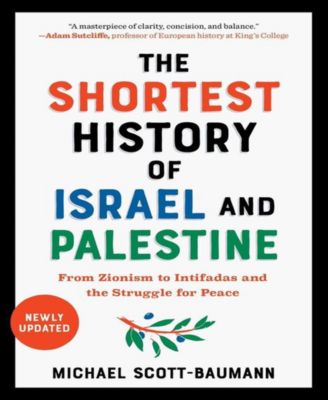Barnes & NobleThe Shortest History of Israel and Palestine- From Zionism to Intifadas and the Struggle for Peace by Michael Scott-Baumann
$16.95
Product details
Web ID: 168370352 reviews
ladyreading365*
3 years ago from seattle
a great book
This was a great book that u learned so much from. Before reading this book, I knew little about their histories. It certainly made me feel like I understand the countries troubles. I certainly recommend reading this book as it is so interesting. It's a great introduction and made me feel like I want to learn more. It was well written and easy to understand. I love this series of books as it overs many countries across the globe. They are a brilliant starting point. They give you plenty to think about. So much praise goes out to the author and publishers for bringing us this very interesting book. I am certainly looking forward to reading the Greece book next.
Recommends this product
Customer review from barnesandnoble.com


A leftist's retelling of the regions history
This book makes a pretense of even handedness in describing the history of the region while none too subtly drawing the usual sickening moral equivalence between peoples, each with a need for and a claim to, superficial or not, land in the region. It blithely ignores the religious imperative written in the Koran to conquer infidels by any means as the central motivating factor in Arab society to refuse to allow one inch of Jewish sovereignty in "Paleatine". For example of its partisanship towards the Arab's claims, the first chapter ends with a shaded two page narrative of the British great grandchild of a Jewish settler who reading his great grand dad's journalsin a ringing condemnation of his ancestor, says how wilfully "blind" he must have been to describe the largely unpopulated, uncultivated land as empty when Palestinian communities were all around him. In a nod to fairness the author aclnowldges the Jewish Aliyahs fled "persecution" in Eastern Europe but nothing of the auto da fes. While there is a detailed description and a defined term for the World Zionist organizations the word "dhimmy" or second class citizen subject to arbitrary tax and persecution for non Muslims in MENA is curiously absent. All the more curious where around 700,000 Jewish people, displaced from their ancestral homes in Judea and Samara were dispersed and enslaved by romans, who named the region Philistine to erase the memory of the Jewish Kingdom that dared to defy them, either fled from or were expelled by Arab nations to end up in Israel. Its obvious the author put a lot of work into the book with many footnotes, a bibliography and the like. But balanced? More like a carefully constructed narrative avoiding the most base reasons why the conflict persists: religious hatred of Jews versus their moral, factual and historic justification for a homeland. No other stateless people are granted the unique definition of refugee (2 years there before Israels formation), their own agency UNWRA, heritavle refugee status. Not the chechens. Not the kurds. And many nations reformed their borders and exchanged populations after WW2 ended without intractable venomous and barbaric violence the palestinians direct against Jewish civilians because of what their leadership says: the identity of their perceived ememies. The book makes no effort to assert the notion that Western and Eastern concepts of the value of human life and freedom are very different in their respecrive societies. So the book becomes a moral failure in and of itself, by an author who should have known better.
Customer review from barnesandnoble.com